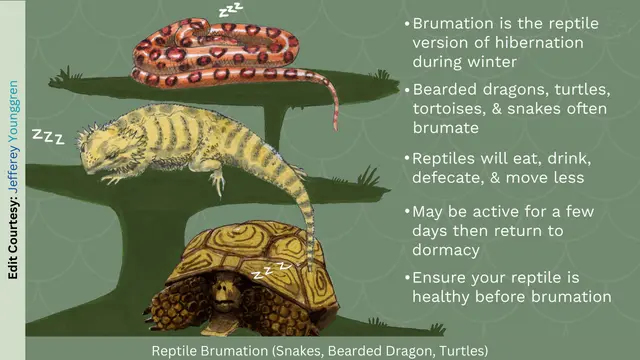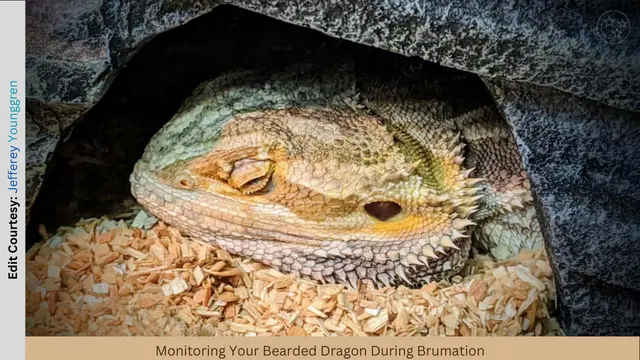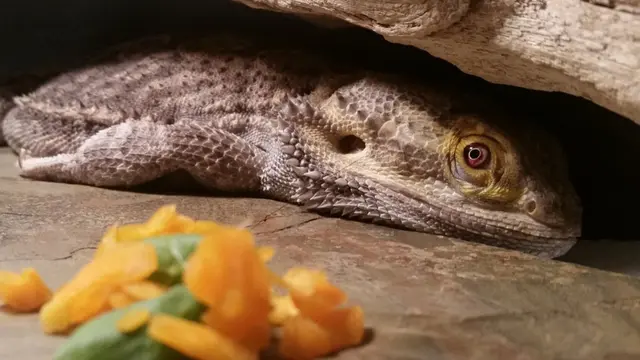If you are a bearded dragon owner, you might have heard of brumation – a period of dormancy that these reptiles go through during the winter months.
Brumation is a natural process that allows bearded dragons to conserve energy and survive harsh weather conditions.
In order to survive brumation, bearded dragons may exhibit different behaviors, and some may keep their eyes open or occasionally open them, while others may keep their eyes closed throughout the entire brumation.
Although it is possible for bearded dragons to remain awake in captivity and open their eyes, it is also possible for them not to brumate.
Why Do Bearded Dragons Brumate?
A bearded dragon is an ectotherm, meaning it cannot regulate its own body temperature and depends on the environment to stay warm or cold.
In the wild, bearded dragons brumate to survive harsh weather conditions and lack of food.
By slowing down their metabolism, they can conserve energy and survive for longer periods without eating.
Brumation also helps them synchronize their breeding cycle with the changing seasons.

Signs of Brumation in Bearded Dragons
Bearded dragons will show signs of brumation before they actually enter the dormant state. Some of the signs include:
- Decreased appetite
- Decreased activity level
- Spending more time sleeping
- Basking less often
- Darkening of skin color
- Digging or burrowing behavior
Do Bearded Dragons Brumate with Eyes Open?
yes, Bearded dragons can brumate with their eyes open. Also they can brumate with their eyes close. Some bearded dragons will keep their eyes open during brumation, while others will close their eyes and remain in a sleep-like state. Keeping their eyes open does not harm them, as they are not conscious during brumation and are not using energy to keep their eyes open.
How to Prepare for Brumation
If you have a bearded dragon, it is important to prepare for brumation properly. This includes providing a suitable enclosure, reducing the temperature and lighting, and reducing the feeding schedule.
To prepare for brumation, you should adjust your bearded dragon’s lighting to only 8-10 hours of light per day.
You should also stop feeding them meat for around two weeks before initiating brumation.
It is important to ensure that your bearded dragon remains properly hydrated during brumation.
For optimal conditions, turn off your dragon’s basking bulb and UV light and aim for a daytime temperature of around 68 degrees Fahrenheit.

Monitoring your Bearded Dragon during Brumation
During brumation, you should continue to monitor your bearded dragon’s health and well-being.
This includes checking their weight, hydration levels, and overall health.
You should also provide fresh water and food once a week to ensure that your bearded dragon stays hydrated and does not lose too much weight.
How Long Does Brumation Last?
The length of brumation can vary depending on the individual bearded dragon and the conditions they are kept in. Some bearded dragons may only brumate for a few weeks, while others may brumate for several months. It is important to let your bearded dragon brumate for as long as they need to and not try to wake them up before they are ready.
How to End Brumation
Bearded dragons will naturally end their brumation period when the weather starts to warm up and the days start to get longer.
However, if you need to wake your bearded dragon up early for any reason, you should do so slowly and gradually.
Start by increasing the temperature and lighting in their enclosure over a period of several days until they are fully awake and active again.
Can Bearded Dragons Brumate in Captivity?
Yes, bearded dragons can brumate in captivity.
However, it is important to provide a suitable environment for them to do so, including a cooler temperature and reduced lighting.
It is also important to monitor their health and well-being closely during brumation and to ensure that they have access to fresh water and food once a week.
Can Brumation be Prevented?
While it is possible to prevent brumation by keeping your bearded dragon in a warm and well-lit environment all year round, it is not recommended.
Brumation is a natural process that is important for the health and well-being of your bearded dragon. Preventing brumation can also lead to health problems and reduced lifespan.
Conclusion
In conclusion, bearded dragons can brumate with their eyes open or closed, and this is a natural process that helps them conserve energy and survive harsh weather conditions.
It is important to prepare for brumation properly, monitor your bearded dragon’s health and well-being closely during this time, and let them brumate for as long as they need to.
By understanding the process of brumation and how it affects your bearded dragon, you can help ensure that they stay healthy and happy.
FAQs
- Can bearded dragons brumate in groups?
Yes, bearded dragons can brumate in groups, but it is important to provide enough space and resources for each individual to do so comfortably.
- Should I wake my bearded dragon up if they are brumating?
No, you should not wake your bearded dragon up if they are brumating. Let them brumate for as long as they need to and only wake them up if absolutely necessary.
- Can brumation affect my bearded dragon’s lifespan?
No, brumation is a natural process that is important for the health and well-being of your bearded dragon and should not affect its lifespan.
- Can bearded dragons eat during brumation?
Bearded dragons may stop eating during brumation, but you should still provide fresh water and food once a week to ensure that they stay hydrated and do not lose too much weight.
- How can I tell if my bearded dragon is ready to come out of brumation?
Your bearded dragon will naturally come out of brumation when the weather starts to warm up and the days start to get longer. However, if you need to wake them up early, do so slowly and gradually over a period of several days.
